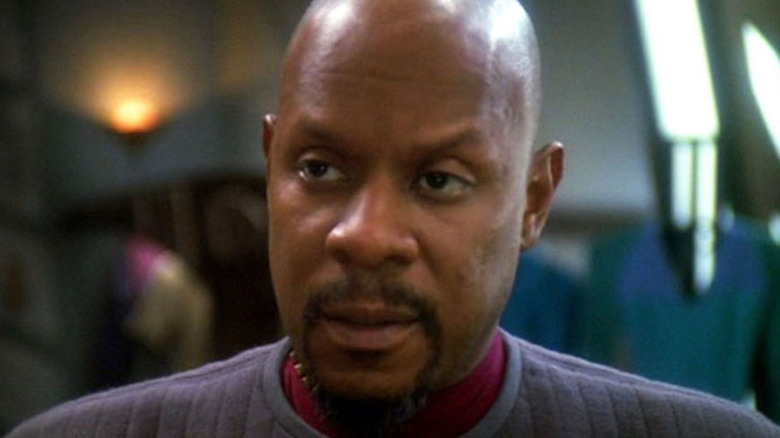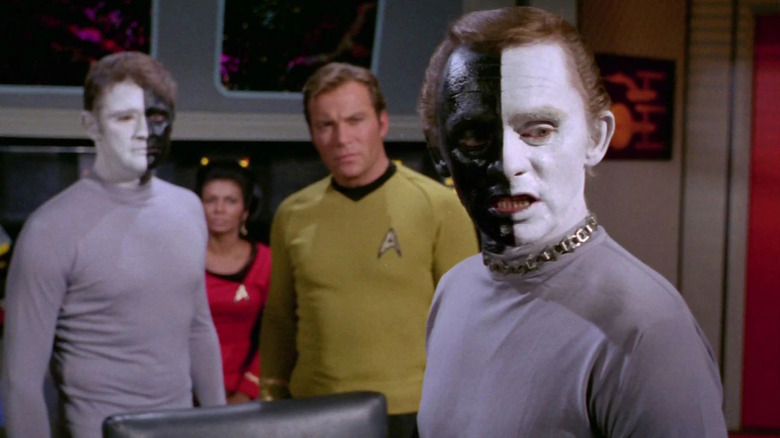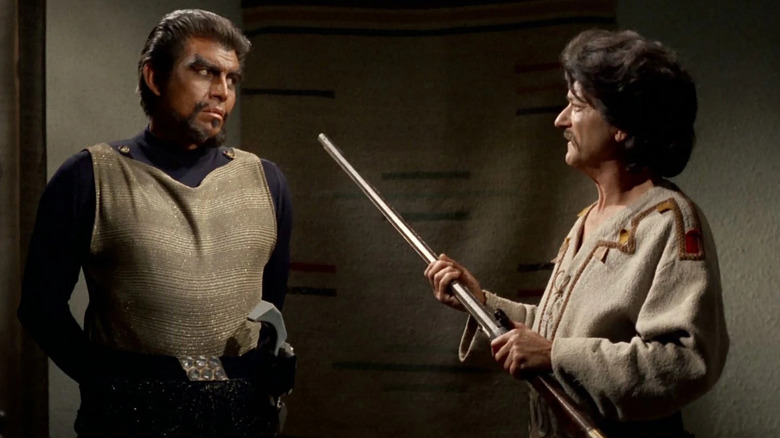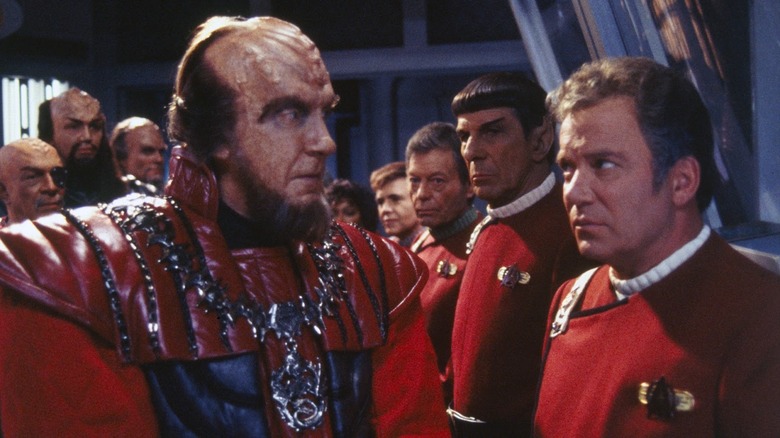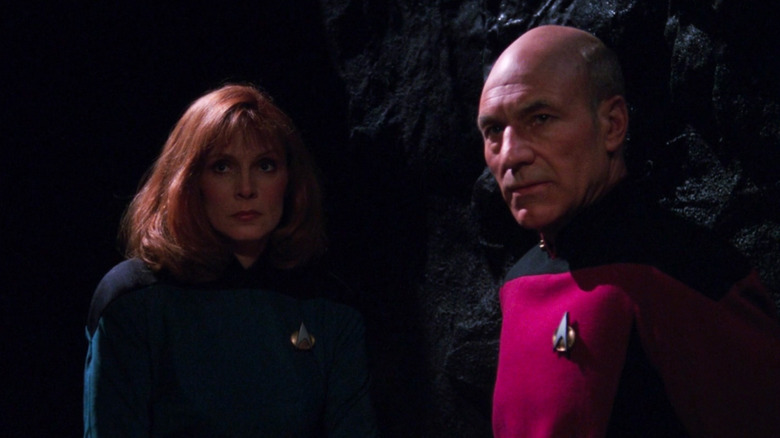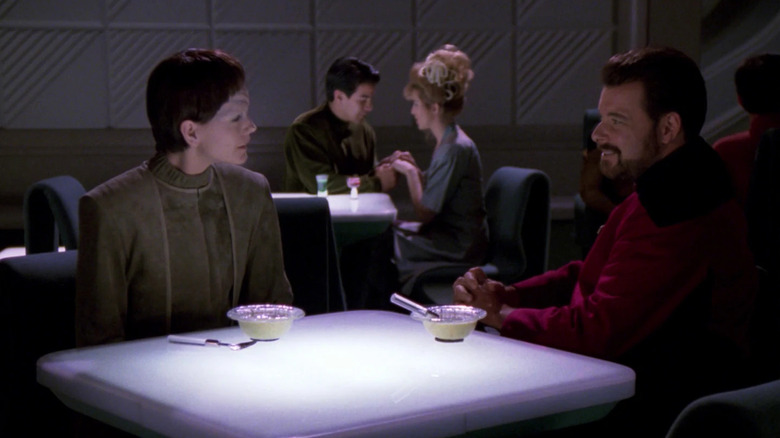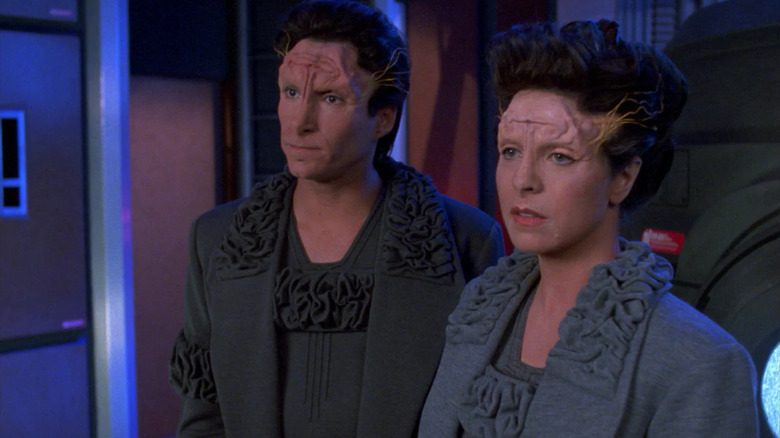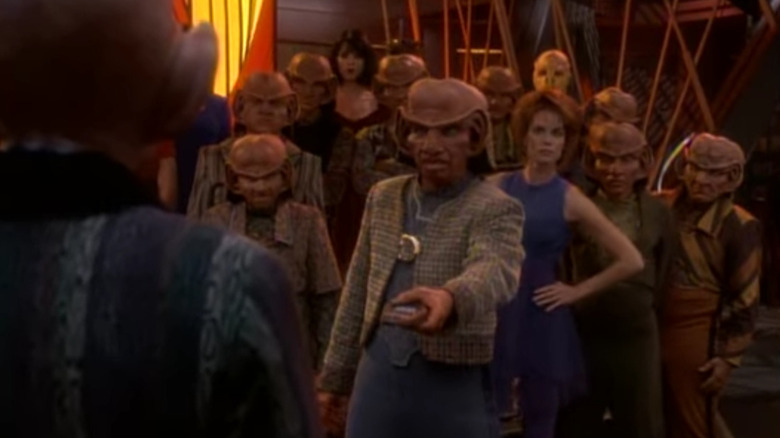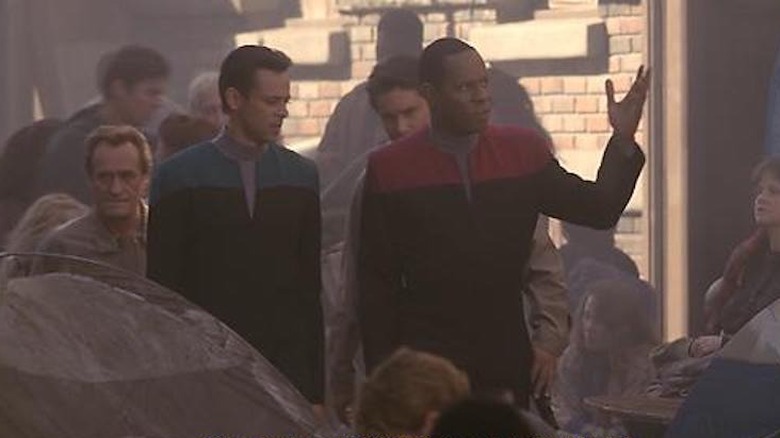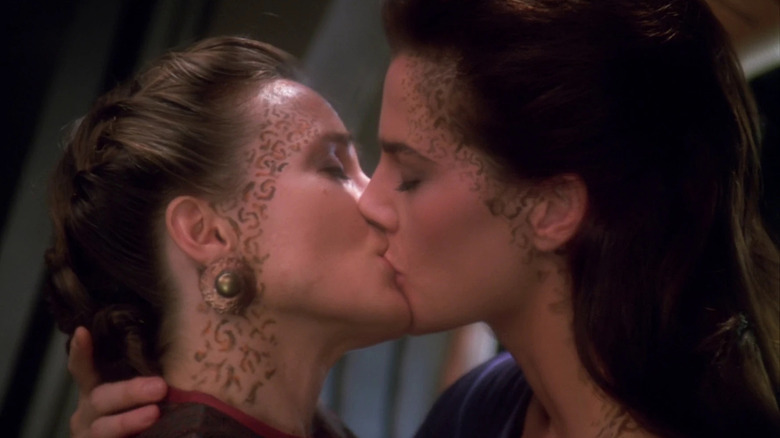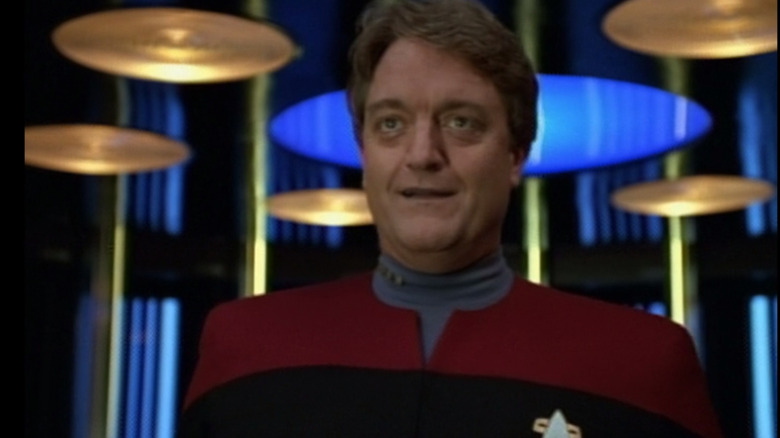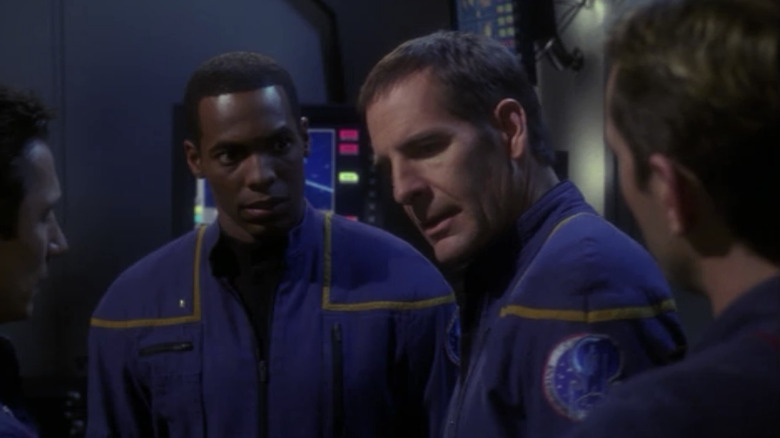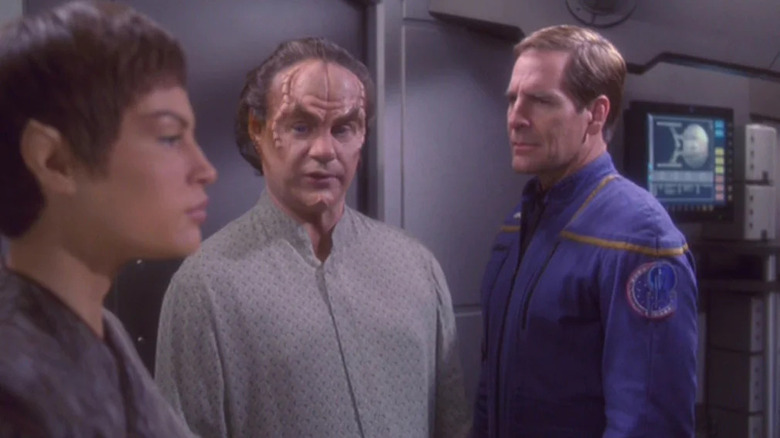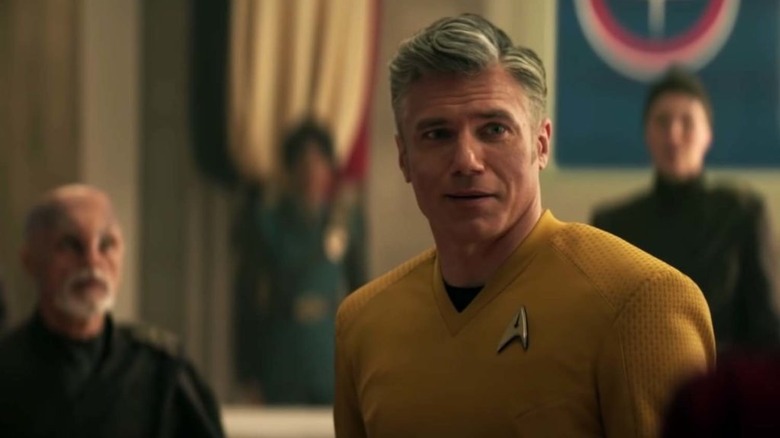Times When Star Trek Got Seriously Political
Throughout the long history of "Star Trek," the franchise has become known for its optimistic outlook on the future and tales of space exploration and scientific discovery, often with a moral or ethical dilemma at the center. In recent years, some audiences have griped that newer "Star Trek" shows like "Discovery" and "Picard" have become a bit too political, but the truth is that social issues have long sat at the center of some of the franchise's best episodes.
While "Discovery" has openly discussed and examined important problems of today like LGBTQ issues and the rise in political extremism, the older "Trek" series told stories that focused on problems facing society in the 1960s through the '90s. Whether it was racism or class struggles, "Star Trek" has never shied away from divisive topics and has never feared making judgments about what is right and what is wrong. After all, that's what science fiction often does: teach morals through the use of clever outer-space metaphors. The following list is just a small sampling of the many times that "Star Trek" stories have gotten seriously political from 1966 to today.
Let That Be Your Last Battlefield (The Original Series)
Getting the most obvious political analogy out of the way first, the "Original Series" story "Let That Be Your Last Battlefield" is commonly cited when discussing episodes that tackled social issues. It features "Batman" star Frank Gorshin as alien Commissioner Bele, who has been hunting Lokai, a traitor to his people. Lokai asks Kirk for asylum and the Enterprise captain is duty-bound to take the case to the Federation. Both he and the crew are baffled as to the nature of the conflict between the two men. At the conclusion, Bele reveals how superficial it really is: members of Lokai's group are black on the left side of their faces, while Bele's are black on the right side.
Those who claim today that older "Trek" never hit viewers over the head with its political messaging must be looking past this episode, whose allegories are anything but subtle. The aliens' simple but effective black-and-white face paint lays out the racial component pretty plainly, while the patent ridiculousness of it effectively reflects how judging people by the color of their skin is nonsensical in real life, too. The episode ends with Lokai and Bele continuing their feud and Kirk commenting on the sad nature of their endless, meaningless racism.
Like the best of the genre, "Let That Be Your Last Battlefield" uses sci-fi tropes to present a social message of tolerance and diversity that was all the more meaningful during the era it aired, in the middle of the Civil Rights movement of the 1960s.
A Private Little War (The Original Series)
Racism and civil rights weren't the only hot-button political issue raging in the 1960s. America was deeply embroiled in military conflict in Vietnam while neck-deep in a Cold War arms race with their Soviet rivals. As many have since noted, the Klingons were often stand-ins for the Russians in "Star Trek" lore of the day. The writers used them to tell politically minded stories, such as the Season 2 episode "A Private Little War." The 1968 episode is famous for its big, horned, gorilla-like creature the Mugato. It focuses on a Stone Age civilization on an alien world that, to Kirk's dismay, has somehow acquired firearm technology.
Kirk, Spock, and McCoy soon trace the origin of the weaponry to the devilish Klingons, who have been supplying one side of a warring conflict on the planet with flintlock rifles, far more advanced than the primitive sticks and stones of their enemies. Overmatched, one member of the lesser-equipped faction becomes enamored with Kirk's phaser weapon after seeing it in action and wants it to overpower their enemy's projectile weapons.
While this may sound like a compelling adventure story in its own right, its timing during the Vietnam War was no coincidence, as the two sides in the Asian country were backed by bigger adversaries: the United States and the Soviet Union. A commentary on the conflict in Vietnam and the dangers an arms race can pose, it was a clear statement from creator Gene Roddenberry, himself a military veteran.
Star Trek VI: The Undiscovered Country
Released in 1991, "Star Trek VI: The Undiscovered Country" was just as transparent about its metaphor as the episodes of "The Original Series," with the Klingons again standing in for the Soviet Union. Just two years after the fall of the Berlin Wall and the end of the Cold War between the United States and Russia, the film depicted similar events in the Final Frontier, as the Klingons opened peace negotiations with the Federation.
While the smoothing of relations between the two global superpowers in the real world was met with celebration, the movie addresses how old hatreds between bitter rivals can be hard to forget. Many were still nervous about becoming allies with the Soviets. The film explores the issue and tells us why it's so important to learn to trust and forgive. The film also includes at least one near-literal recreation of a real-world event, a famous exchange during the Cuban Missile Crisis between Adlai Stevenson and Soviet Ambassador Valerian Zorin.
In the end, with relations between the Federation and Klingons on the brink following multiple assassination attempts, Kirk gives an impassioned speech to a joint gathering of both sides in the conflict. In his final words of peace, he proclaims that they must put aside their differences to work toward a better world, addressing the audience as much as the Klingon and Federation ambassadors.
The High Ground (The Next Generation)
Moving into the 1980s and '90s, "Star Trek: The Next Generation" began exploring new and bolder social and political issues, although sometimes their efforts were less than successful. The Season 3 episode "The High Ground" stands out as one that worked well. It dealt with the fine line between terrorist and freedom fighter, a theme that would become central in the later spin-off series "Deep Space Nine." This earlier episode introduces a violent conflict on an alien world where the Ansata people are seeking political autonomy. The regime on his planet denies them, and so their leader, Kyril Finn, leads his people in a fight for independence. He eventually draws the Enterprise into the conflict by kidnapping Dr. Crusher to help him in a medical crisis.
During her imprisonment, Finn gives a powerful speech, equating his fight to that of George Washington, even though everyone else labels him a terrorist. One could view this story as an analog for the Irish independence movement that had raged for nearly 100 years, with the Irish Republican Army responsible for some of the worst terrorist attacks in Europe throughout the '70s and '80s. In fact, a key exchange between Captain Picard and Commander Data about the relative effectiveness of terrorism mentions the "Irish Unification of 2024," where violent extremists eventually succeeded in creating a united and independent Ireland (in "Trek's" fictional history). A bold and controversial political take, that single scene got the episode banned in the UK for decades.
The Outcast (The Next Generation)
"Star Trek" took far too long to have its first openly gay characters, committed couple Stamets and Culber on "Star Trek: Discovery." Still, the franchise addressed LGBTQ rights through metaphor more than once, most notably in the "TNG" episode "The Outcast." In this fifth-season installment, we get a sci-fi twist on gay rights when we visit the planet J'Naii, a world where the people have only one gender and are largely androgynous from a human perspective. We soon meet a young J'Naii named Soren, who explains that a small percentage of their people are sometimes born with a male or female inclination.
As it turns out, Soren is one such individual. She identifies as female, a fact she has been forced to hide all her life for fear of becoming an outcast on her world. She starts a romance with Commander Riker, which exposes her secret and puts her in danger. Exploring a society where a person's gender and sexuality can make one the victim of persecution is sadly still a political issue today, but in 1992, when "The Outcast" aired, it was truly a taboo subject for a prime time series. That's why the LGBTQ issue is hidden under an alien cover. Nevertheless, it definitively declares that nobody should be judged or criminalized for their sexuality and gender identity.
Thankfully, today we have more open characters and couples in "Star Trek," including Seven of Nine and Raffi on "Picard" and the non-binary Adira on "Discovery."
Force of Nature (The Next Generation)
In 1994, during the seventh season of "Star Trek: The Next Generation," the series addressed another serious issue society was facing that had become increasingly political. "Force of Nature" opens with a Starfleet vessel lost in a hazardous region of space. The Enterprise is called in to find it. When it does, the crew discovers the lost ship was intentionally disabled by a pair of scientists who theorize that their sector of space has been damaged by the warp engines of ships passing through it. They've taken to disabling these ships to get the attention of the Federation. Picard is reluctantly forced to investigate their hypothesis.
A message episode, "Force of Nature" is a story about the dangerous effects of man-made technology on the environment and an obvious parallel to global warming, which was an even more controversial subject in the early '90s. The establishment pushes the two scientists aside and views them as alarmist crackpots because, if their theories are correct, it would mean the end of space travel as it exists in the 24th century. This is similar to how the drastic measures needed to avert climate change disaster would mean radically altering the way we live even today, some 30 years after the episode aired.
Ultimately, the two scientists are proved correct, and Starfleet orders a limit to the use of warp speed. Unfortunately, this is one message that society has failed to heed from "Star Trek."
In the Hands of the Prophets (Deep Space Nine)
"Star Trek: Deep Space Nine" embraced political issues far more than any other series in the franchise. One episode early in its run stands out for its exploration of a debate that has raged for decades and continued into the 21st century. During the Season 1 finale "In the Hand of the Prophets," Keiko O'Brien is having problems at the station's school, where she's begun teaching the science behind the wormhole and the alien life forms that live within it.
The problem is that to the Bajorans, the wormhole is a religious icon known as the Celestial Temple and the home of the Prophets, alien beings they believe to be deities who have guided their people for hundreds of years. Mrs. O'Brien receives demands from Bajor's religious leader, Kai Winn, to cease teaching this blasphemy. The schoolteacher feels it is wrong to hide the natural world from her students due to religious objections. Eventually, the debate escalates to violence when religious extremists target the school and threaten to shut it down entirely. It's a powerful episode that brings up important issues that still plague us today, with LGBTQ issues and lessons on evolution being removed from schools on religious grounds.
The science vs. religion debate was never going to be solved in an episode of "Star Trek." Still, "In The Hands Of The Prophets" declares strongly that no form of dogma should trump scientific fact.
Bar Association (Deep Space Nine)
From terrorism to racism and everything in between, "Deep Space Nine" packed its episodes full of social issues. They even tackled labor rights. In "Bar Association," the employees of Quark's bar organize a union. Quark is the show's resident Ferengi, a species whose entire culture centers on profit and greed. While the United Federation of Planets can often be described as a utopia with no monetary system, the Ferengi are driven almost solely by the accumulation of wealth, with their sacred precepts "The Rules of Acquisition" serving as their guiding philosophy. These rules provide the basis for the exploitation of the working class. In "Bar Association," Quark's brother Rom–his highest-level employee–has finally had enough of the low wages, poor treatment, and lack of benefits.
At the urging of Chief O'Brien, who describes his Irish ancestor Sean as a hero and a union man, Rom organizes the Guild of Restaurant and Casino Employees. The formation of the union is illegal in Ferengi society and the Ferengi Commerce Authority violently attempt to bust it. The episode demonizes such anti-union practices and states unequivocally that Starfleet respects and encourages the right to collective bargaining. Chief of Security Odo notes that Starfleet's orders are to allow the employee protests outside the bar, so long as they remain peaceful.
Whatever you might think of unions, "Star Trek" philosophy tells us that they are an important part of a worker's rights.
Past Tense (Deep Space Nine)
An episode that may be even more topical today, the two-part Season 3 episode of "Star Trek: Deep Space Nine" sends Sisko, Dax, and Bashir back in time to 2024, which was still some 30 years away at the time it aired. The episode focuses on homelessness and class inequality. Sisko and Bashir wind up trapped inside a so-called "Sanctuary District," a government-run homeless encampment where people are sent when they have no jobs and nowhere to go. Some are mentally ill and unable to get help, while others are simply ordinary people in a bad situation.
As it turns out, they arrive just a few days before an important and historic riot for the rights of the people in the Sanctuary District. Juxtaposed with their story is that of Dax. Dax gets discovered by a wealthy tech magnate and media mogul named Christopher Brynner, who today might be likened to Elon Musk or Jeff Bezos. While Sisko and Bashir struggle for food and water in the Sanctuary District, Dax lives the high life in a literal ivory tower with Brynner, illustrating the class inequality that "Trek" was predicting for the 2020s.
The episode boasts eerie similarities to the civil unrest that seems to be on the rise today, which has been noted by many. "Past Tense" also firmly states that such protests–and even riots–are indeed justified.
Rejoined (Deep Space Nine)
"Star Trek" is famous for many things, including pioneering representation. In 1966, the episode "Plato's Stepchildren" is widely credited for portraying one of the first interracial kisses on American television. They were a little late on the first gay kiss on television. Even so, it was still a controversial moment on "Deep Space Nine" when, in the 1996 episode "Rejoined," Dax locks lips with Lenara Kahn, her former lover. The episode is more meaningful than the kiss alone.
In "Rejoined," Dax–who regularly swaps genders in her centuries-long life when her symbiont is placed into a new host body–reconnects with Lenara Kahn, whom one of Dax's previous hosts had married many years before. In Trill society, the move to a new host means severing old connections, so it is forbidden to "reassociate," or resume relationships with a former lover. As Dax and Kahn become reacquainted, the sparks are still there. The two can't resist pursuing a renewed love affair, putting their reputations and lives at risk.
The episode has been cited by many as a meaningful exploration of LGBTQ issues. Producers of the series have lamented not going further. Still, as safe as the story seems by some standards, it took on the issue with sensitivity and grace. It also conveyed loudly and clearly that love between consenting adults should not be confined by the expectations of society.
Death Wish (Voyager)
Out of all the "Star Trek" shows, "Star Trek: Voyager" steered the clearest of controversial issues, but when it went after taboo topics, it went hard. Such was the case in the Season 3 episode "Death Wish," which looked at the issue of the right to die. Its story was ripped from the headlines, airing the same year that infamous doctor Jack Kevorkian faced trial for assisted suicide.
Though best remembered for the return of the classic "Trek" villain called Q, the episode is unforgettable for other reasons. It involves Captain Janeway discovering a rogue comet that's actually a prison created to confine a renegade member of the Q continuum, a man dubbed "Quinn." The immortal Quinn has been imprisoned by his people for the crime of wanting to end his own existence. The rest of the story has Quinn testifying in a hearing after he requests asylum on Voyager. Q (John de Lancie) agrees not to pursue him further if Janeway decides in his favor.
Over the course of the hearing, Commander Tuvok defends Quinn's right to die, while Q attempts to portray him as a sick, deviant individual. While Janeway asks Quinn to reconsider living and urges him not to end his life, she ultimately decides that he should have the right to decide how and when he should die.
If you or anyone you know is having suicidal thoughts, please call the National Suicide Prevention Lifeline at 1-800-273-TALK (8255).
The Xindi War (Enterprise)
Beginning its run just weeks after the September 11th terrorist attacks in 2001, "Star Trek: Enterprise" slowly abandons its initial optimistic and hopeful tone, eventually reflecting the somber mood of post-9/11 America. In its third season, the series opens with a storyline that includes a surprise attack on Earth by a terrifying new enemy. Called the Xindi, they are an obvious stand-in for the terrorist group that attacked America. The Xindi comprise different groups with a common goal: the destruction of Earth.
Throughout the season, Captain Archer and his crew seek revenge on the Xindi for the seemingly unprovoked attack while also trying to prevent a second, much as America was doing against Al Qaeda. The season was more than just a parallel of real-world events; it had a social message as well, arguing that we should seek peace even with those who wish to do us harm. It went out of its way to portray the Xindi not as a group of bloodthirsty madmen, but as a wronged people looking for their own kind of justice.
The episode "Detained" even taught us not to paint an entire people with the same brush because some have extremist views. It instead preaches tolerance and understanding. While this all might seem like common sense now, it was certainly a politically risky take at the time for some, as America was grappling with a wave of Islamophobia and anti-Muslim violence.
Stigma (Enterprise)
"Star Trek: The Next Generation" once famously nixed a proposed episode that would have played as a metaphor for the AIDS epidemic in the late '80s. They tackled the issue eventually during the fourth spin-off "Enterprise" in the Season 2 episode "Stigma." The episode revolves around T'Pol, who is suffering from a neurological disease called Pa'nar Syndrome. The only way to contract the disease is through mind melding, which at this point in "Trek" history is considered a forbidden practice. Far from the more commonly accepted ritual seen in the original "Star Trek" series, here it's a subject too taboo to even talk about on Vulcan.
When T'Pol learns she has the disease, she knows that she got it from a group of dissident Vulcans who practiced the mind meld regularly–as seen in a previous episode that itself was a controversial allegory for sexual assault. Now, in "Stigma," T'Pol is hesitant to seek treatment because even having Pa'nar Syndrome could get her removed from her position and make her a pariah among her people.
The parallels to the AIDS crisis are obvious. In the end, T'Pol takes a powerful stance on the issue in the episode. Even though she contracted the disease due to an assault — and would thus receive lenience — she doesn't want to acknowledge or condone her people's prejudice. Instead, she wants to stand up for the rights of all Vulcans who practice mind melds and fight for their acceptance in society.
Strange New Worlds (Strange New Worlds)
In the latest "Star Trek" series, "Star Trek: Strange New Worlds," the franchise gives us the adventures of Captain Pike aboard the classic starship Enterprise. The premiere episode is a story that serves as a warning about where we're headed as a society given the increasing polarization on both sides of the political spectrum. While the episode largely deals with the question of violating the Prime Directive and rescuing kidnapped crew members, its finale sees Pike lecturing the leaders of a less advanced society he claims is on par with 21st century Earth.
Two warring factions on the planet stand on the brink of a conflict that could destroy them both. Pike gives an inspiring speech in which he warns them about what that could mean for their future, using the example of his homeworld. According to Pike, Earth was itself at the same crossroads in the 2020s. Sadly, it chose the path of war, leading to global devastation the likes of which they'd never seen. As he speaks of this moment in his people's past–and our future—images of our very real 21st century flash on the screen, including news footage captured during protests in Ukraine and the January 6th Capitol Insurrection in Washington, D.C.
Pike's words are meant not just as a message to the squabbling delegates of the planet Kiley, but also as a word of caution to real-life viewers that we too could be headed for a crisis point.
